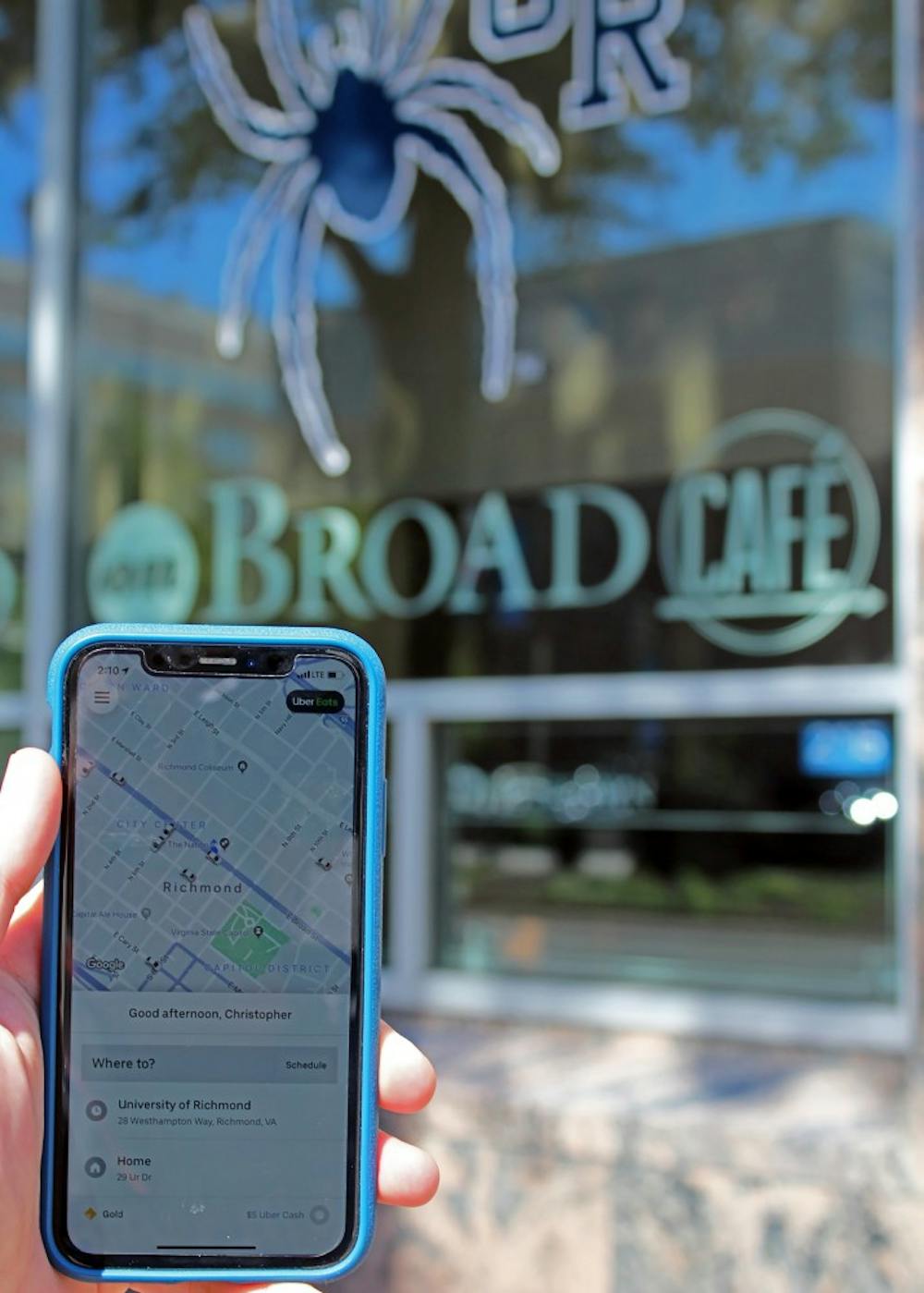This semester, a pilot program created through a partnership with Uber Business is replacing the University of Richmond Downtown shuttle.
The program, which began on Sept. 16, allows students to register to join UR’s Uber account, to which they can charge Uber trips between campus and UR Downtown, according to the Transportation Services website. The operating hours for this service are 9 a.m. to 5:30 p.m. Monday-Friday.
The planning process for the program began several months ago, when John Persche, ’17, who works as a member of the Uber partnerships team, contacted Richmond College Dean Joe Boehman about a potential partnership between Uber and UR. Persche said Boehman had connected him with University Police Department Chief David McCoy, who oversees Transportation Services.
Persche and a colleague from Uber Business then worked with Transportation Services to formulate plans for the program.
“When I started my search [for schools to partner with], Richmond immediately popped up in my head, and I thought, ‘Why would Richmond not be on this right now?’” Persche said. “I thought it would be a perfect opportunity, and I started reaching out from there.”
Persche said that during his time as a student at UR, the shuttles offered by Transportation Services had been underused. Uber provides a more convenient transportation option for students, Persche said.
The cost of replacing the UR Downtown shuttle with Uber was a major factor in Transportation Services’ decision to test university-sponsored Uber rides this semester, said Natalia Green, director of Parking Services.
The UR Downtown shuttle usually has a fair number of riders in the mornings and in the afternoons, but far fewer passengers in the middle of the day. Because of this low passenger volume, it made economic sense to try using Uber, which accrues costs per ride rather than per hour as the university shuttles do, Green said.
Persche said he originally had approached university officials with the idea for a partnership in late February or early March of this year. In June, Uber and UR smoothed out details of the plan, with beta testing for the pilot program beginning in August.
Persche was not involved in the testing period, he said. But several members of the Bonner Center for Civic Engagement were, as they tested the program out by taking Ubers between campus and UR Downtown.
Anthony Crenshaw, director of operations and strategic initiatives at the CCE, used the Uber program during this testing period and was responsible for the communication of feedback on the beta phase to Transportation Services.
Although some Uber drivers’ lack of familiarity with UR’s campus may be problematic, Crenshaw’s travel by Uber during the beta phase went well, he said.
Enjoy what you're reading?
Signup for our newsletter
The beta testing phase was useful in identifying what needed to be changed in the program before it was rolled out to the general student body, Green said. For instance, the testing phase helped Transportation Services refine its policies for Uber pick-up locations on campus, which originally had been planned for five specific spots. Now, students can be picked up from anywhere on campus.
Senior Griffin Walsh said he had signed up for the Uber program after reading about it in a SpiderBytes post. He used the program to take an Uber to UR Downtown, about three blocks away from the internship he was traveling to.
Although Walsh said he had some concerns about the sustainability of Ubers compared with the shuttle, and about a continued disconnect from Richmond’s bus system, he said his trip had been convenient and that he would be willing to use the Uber program for future travel downtown. Walsh also sees the program as potentially increasing student engagement with the city.
“I think people would be willing to go downtown, just to see it, and I think it’s a very convenient way,” Walsh said. “I think it’s faster than the bus, and you don’t really have to navigate the schedules and everything, so I think there is opportunity for more people to get downtown.”
Although Green said she preferred the greater control afforded by shuttle systems, she acknowledged Uber as “a way of life” for current college students and noted its convenience and scheduling flexibility.
Ultimately, though, Green said, the decision about whether to continue the Uber program beyond this semester may depend largely on cost.
“Money plays a big factor in it, so what we ask people to do is give us feedback on it, you know, the good and the bad, see how it works,” Green said. “We want to make sure that we don’t overspend the budget that we have for shuttles on this program because then that’s going to take money away from some other projects that we have to do, too.”
During the spring semester, there usually are a third more students riding the UR Downtown shuttle, Green said, which may complicate the question of which transportation source is more cost-effective.
Persche, though, said he hoped to see the program extend far into the future.
“I would say that overall, hopefully this becomes successful,” Persche said. “I would love to see Uber become a big part of the University of Richmond.”
Contact copy chief Savannah Wilson at savannah.wilson@richmond.edu.
Support independent student media
You can make a tax-deductible donation by clicking the button below, which takes you to our secure PayPal account. The page is set up to receive contributions in whatever amount you designate. We look forward to using the money we raise to further our mission of providing honest and accurate information to students, faculty, staff, alumni and others in the general public.
Donate Now



